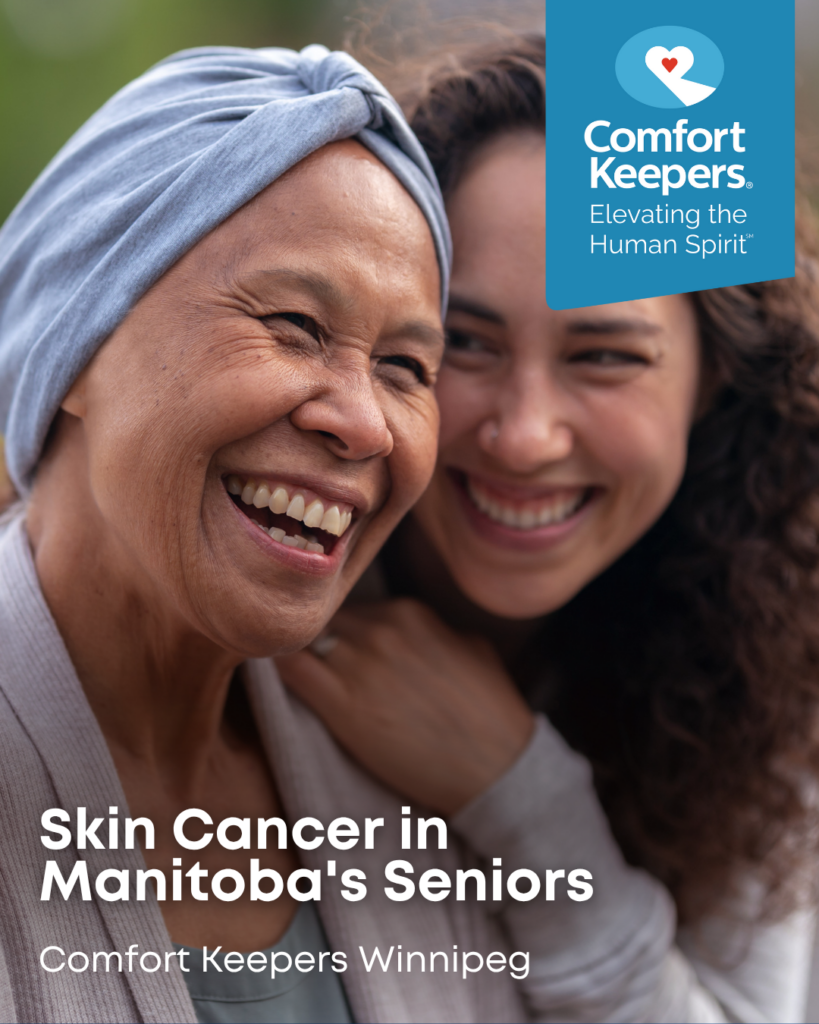Skin Cancer in Winnipeg’s Seniors
Winnipeg Senior Health | May 16, 2025

What Every Senior in Winnipeg, MB, Needs to Know About Skin Cancer Development, Identification, and Risk Reduction
Skin cancer remains the most commonly diagnosed cancer in Canada, with more new cases each year than breast, prostate, lung, and colon cancers combined. While many people are familiar with the three main types—basal cell carcinoma, squamous cell carcinoma, and melanoma—the process of how skin cancer develops is less widely understood.
In this blog, you’ll learn how skin cancer forms, the key differences between each type, and how seniors can identify warning signs and take steps to reduce their risk.
Fast Fact: According to the Canadian Skin Foundation, over 80,000 cases of skin cancer are diagnosed in Canada each year.
Development and Types of Skin Cancer in Seniors
The outer-most layer of our skin, known as the epidermis, is composed of three cells: squamous, basal, and melanocytes. Over time, as ultraviolet rays (from the sun or artificial sources like tanning beds) come into contact with the skin, DNA within the skin cells can become damaged, resulting in mutations. These mutations can then cause skin cells to multiply in quick succession, eventually invading the dermis layer of the skin. The classification of skin cancer depends solely on the epidermal skin cell from which it originated.
Basal cell and squamous cell carcinoma, two very common types of skin cancer, are considered highly curable and have been linked to those who spend a considerable amount of time outside and thus are frequently exposed to the sun. Melanoma, though less common, is recognized as more serious and potentially life-threatening. Resulting from the rapid growth of the aforementioned melanocyte cells, melanomas tend to manifest as red, brown, or pink mole-like formations or even form moles themselves.
For men, melanoma generally develops on the head or neck, and for women, it is often found on the legs, arms, or other extremities. That being said, melanoma can certainly develop in other areas of the body (wherever melanocytes are found), including the mouth, eyes, and even the gastrointestinal tract. Unlike squamous and basal carcinoma, melanoma is seen largely in those who have experienced sunburns from excessive exposure to the sun’s UV rays.
Identifying Melanoma in Seniors
Although the three types of skin cancer are generally considered curable if detected early enough, the possibility of early detection is largely contingent upon one’s own self-examination. To help with identification of melanoma-related areas, the American Academy of Dermatology has created an easy and helpful system. If your aging loved one is concerned about a particular mole or series of moles, help him or her follow the ABCDE’s of melanoma.
The A-B-C-D and Es of Skin Cancer:
Asymmetry:
If you were to draw a line right down the middle of the mole and both sides looked the same (or symmetrical), there’s a good chance it is benign. If, however, the two sides don’t match (or are asymmetrical), it could be a melanoma.
Border:
Pay close attention to the border of the mole. Benign moles generally have smooth borders, while melanomas have irregular or notched borders.
Color:
Another warning signal is if the mole has more than one color, including multiple shades of brown, black, or tan. Additionally, melanomas may become red or blue in appearance.
Diameter:
While benign moles are smaller in size, melanomas tend to be about ¼ inch or larger (or about the diameter of a pencil eraser).
Evolving:
Many of the characteristics listed above may change over time for a mole, in which case you will want to monitor closely. If other changes develop – such as itching, crusting, or bleeding – it could also indicate a melanoma.
Skin Cancer Risk Reduction for Seniors
As mentioned previously, older adults – those 65 years of age or older – are more likely to develop skin cancer than any other age group. The correlation behind this is not complex; seniors have lived longer than others and have had greater exposure to the sun’s UV rays. However, with some extra precaution, seniors can reduce their overall risk of skin cancer.
Here are Six Helpful Tips to Avoid Skin Cancer:
- Avoid tanning beds altogether.
- Use effective sun block (at least SPF 15).
- Avoid going outside between the hours of 10am and 4pm, if possible.
- Wear proper clothing (hat, sunglasses, light, loose-fitting shirts) to protect against UV rays.
- Find shade whenever possible.
- Examine your skin regularly (following the ABCDE’s), and follow up with a medical professional, if you suspect there may be a problem.
Comfort Keepers® Winnipeg Can Help
Our caregivers can help your aging loved ones maintain a consistent daily routine, ensuring they follow sun safety tips and protect their skin from harmful UV rays. We also provide reliable transportation to medical appointments—on time and with care. Contact your local Comfort Keepers® office to learn more about our personalized in-home care services.
Comfort Keepers® Winnipeg Offers a Wide Range of Private Home Senior Care Services
For families concerned about the health and well-being of aging loved ones, we can help with home care services, including Alzheimer’s and dementia care, in-home personal care, respite care, specialized care, in-home nursing, end-of-life care, senior living transition services, and much more!
Comfort Keepers® professional caregivers provide services to ensure safety, health, and happiness without the stress of moving to an assisted living or rehabilitation facility. Individually tailored care plans account for living arrangements, medical issues, physical restrictions, personalities, expectations, and more.
Our Interactive Caregiving™ Approach Enables Top-Notch Homecare
Interactive Caregiving™ provides a system of care that addresses safety, nutrition, mind, body, and activities of daily living (ADLs). Our compassionate caregivers can provide a personalized home care plan for your loved one, allowing them to enjoy a healthier, safer, and more meaningful retirement at home.
Comfort Keepers® is the Most Trusted Name in Senior Care in Winnipeg
Our in-home caregivers ensure our seniors are physically, socially, and mentally engaged. In addition, we provide options, activities, events, and resources for seniors that might otherwise not be available.
Locally Owned and Operated In-Home Personal Care for Seniors
Our caregivers live and work in the Winnipeg area. We know the area and how to assist our clients using local resources. Comfort Keepers® Winnipeg is here to help you and your loved ones get the best care possible. If you live in Winnipeg and require homecare services for senior personal care and wellbeing, contact Comfort Keepers® at (204)-488-4600.
Accredited Home Care for Seniors in Winnipeg
Comfort Keepers® Winnipeg is accredited with Exemplary Standing with Accreditation Canada. Accreditation is an intensive process in which industry experts examine an organization’s processes, policies, and procedures against quality standards. To achieve accredited status, Comfort Keepers® offices met or exceeded the rigorous standards for Home Care companies, as defined by Accreditation Canada.
References:
- Skin Cancer Foundation. “The Sun Keeps Rising: Why Seniors Can’t Skip UV Protection.” Web. 2016.
- NIH Senior Health. “Skin Cancer.” Web. 2017.
- Web MD. “Understanding Skin Cancer – The Basics” Web. 2017
- Canadian Skin Cancer Foundation. “About Skin Cancer.” Web. 2016.
Individualized Home Care Options
Long-Term Home Care, 24 Hour Home Care & Short Term Care Options Customized for You







